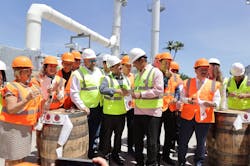Bacardi Commissions Propane-Powered CHP at Puerto Rico Rum Distillery
The world’s biggest rum producer is incorporating new fuels and a variety of decarbonization technologies within its on-site microgrid at its new power plant energizing its largest distillery in Puerto Rico.
Bacardi officials celebrated the opening of the company’s new combined heat and power (CHP) plant at the premium rum distillery in Cataño. The new CHP system utilizes propane and biogas and is designed to cut greenhouse gas emissions by more than 50% versus previous fuel resources, the company says.
The new plant replaces heavy fuel oil and will generate all of the on-site power required by the distillery operations in Cataño. The 137-acre Cathedral of Rum there is considered the biggest such distillery in the world, according to multiple sources.
White Paper on Clean and Affordable On-Site Power with CHP Solutions: Click here to see more
“At Bacardi, we are committed to cutting our GHG emissions by reducing our energy consumption and switching to the most sustainable form of energy where we make our beloved brands. We are continuously exploring ways in which we can take more positive steps towards our ultimate goal of Net Zero across our sites,” Edwin Zayas, Vice President of Operations for Bacardi Corporation in Puerto Rico, said in a statement. “We are proud of the work we are doing in Puerto Rico, and across the globe, to be greener and cleaner with our energy.”
The ribbon-cutting ceremony caps a nearly two-year project since Bacardi announced work on its shift to the propane-fueled CHP system. Propane emits about half of the carbon dioxide compared with diesel and fuel oil, according to the U.S. Energy Information Administration.
Puerto Rico imports most of its power generation resources, except for solar and storage microgrids which power many homes there. Propane is the “most responsible energy source (available) in Puerto Rico right now,” Rodolfo Nervi, vice president for global safety and sustainability at Bacardi, said when the CHP project was announced early last year.
The Cataño site includes Bacardi’s distillery, offices and the Casa BACARDI visitor center popular with tourists to the island. The Bacardi family, which long ago moved operations from Cuba to Puerto Rico, began producing rum there in 1937, according to reports.
Puerto Rico’s power grid system has proved destructively vulnerable to multiple hurricanes over recent years. On-site power resources such as CHP and renewable microgrids and generation plants are regarded as the safest and most sustainable alternatives to the island-wide grid connection.
The spirits producer vows to cut greenhouse gas emissions 50% globally by 2050.
At the Cataño facility, Bacardi is also going to utilize biogas by cleaning wastewater, with the collected gas also used in generating a significant portion of the distillery’s electricity.
The CHP project will recapture nearly all of the heat generated during distillation to improve energy efficiency. Bacardi also is developing a new project to capture CO2 from the fermentation process and supply that to the sparkling drinks industry in Puerto Rico.
On the nature side of the equation, the company is planting pollinator gardens to support wildlife on the island and is planting 161 coconut trees this year to mark its 161st anniversary.
The Microgrid 2024 Call for Speakers is Open: Submit Your Ideas Today
Microgrid 2024 Happening April in Baltimore: Join the Energy Revolution
About the Author
Rod Walton, EnergyTech Managing Editor
Managing Editor
For EnergyTech editorial inquiries, please contact Managing Editor Rod Walton at [email protected].
Rod Walton has spent 17 years covering the energy industry as a newspaper and trade journalist. He formerly was energy writer and business editor at the Tulsa World. Later, he spent six years covering the electricity power sector for Pennwell and Clarion Events. He joined Endeavor and EnergyTech in November 2021.
Walton earned his Bachelors degree in journalism from the University of Oklahoma. His career stops include the Moore American, Bartlesville Examiner-Enterprise, Wagoner Tribune and Tulsa World.
EnergyTech is focused on the mission critical and large-scale energy users and their sustainability and resiliency goals. These include the commercial and industrial sectors, as well as the military, universities, data centers and microgrids. The C&I sectors together account for close to 30 percent of greenhouse gas emissions in the U.S.
He was named Managing Editor for Microgrid Knowledge and EnergyTech starting July 1, 2023
Many large-scale energy users such as Fortune 500 companies, and mission-critical users such as military bases, universities, healthcare facilities, public safety and data centers, shifting their energy priorities to reach net-zero carbon goals within the coming decades. These include plans for renewable energy power purchase agreements, but also on-site resiliency projects such as microgrids, combined heat and power, rooftop solar, energy storage, digitalization and building efficiency upgrades.

